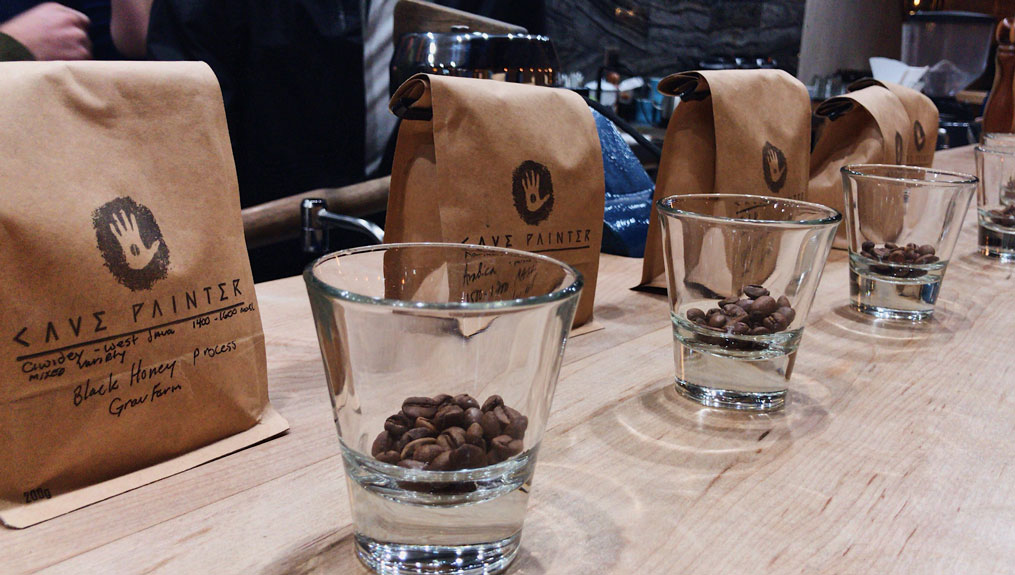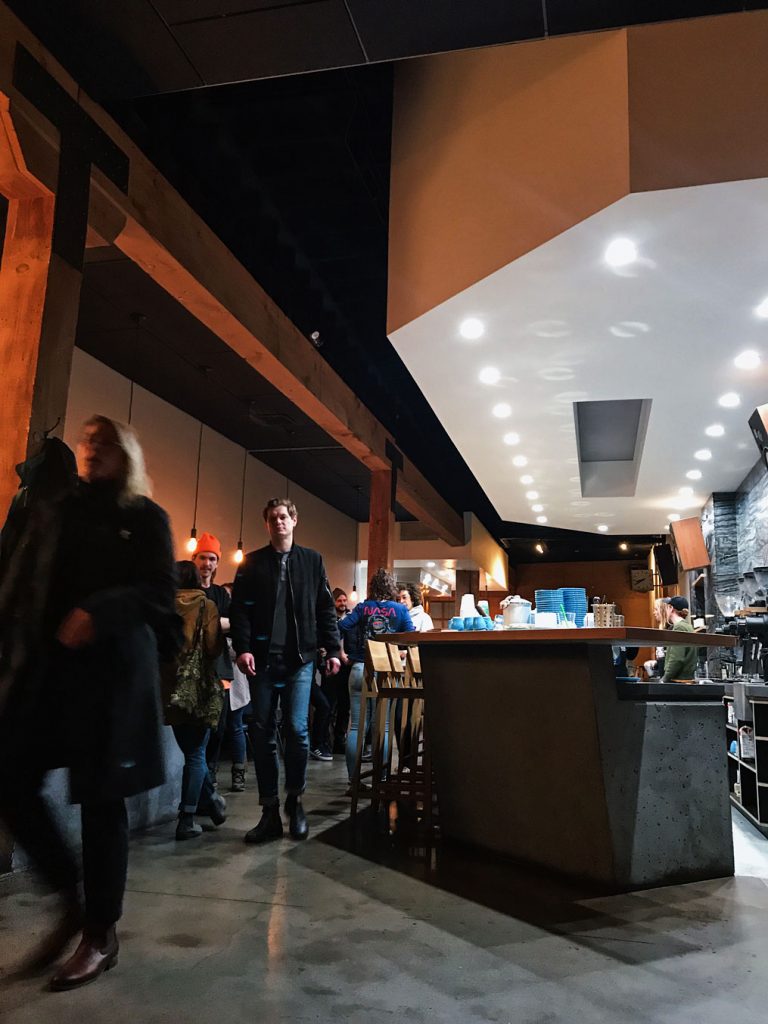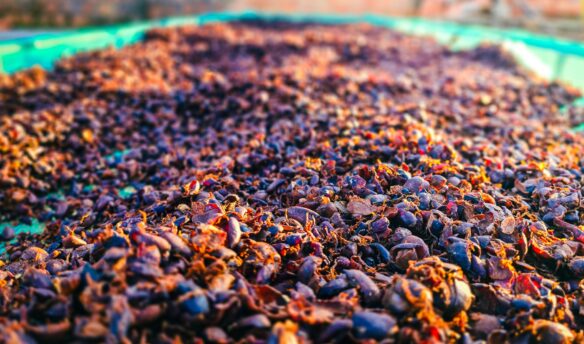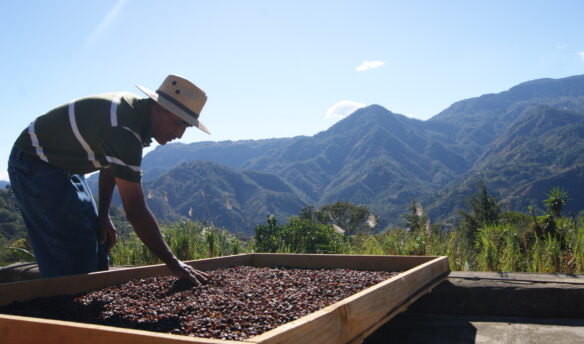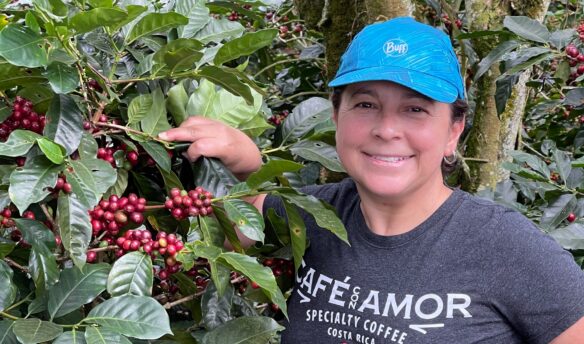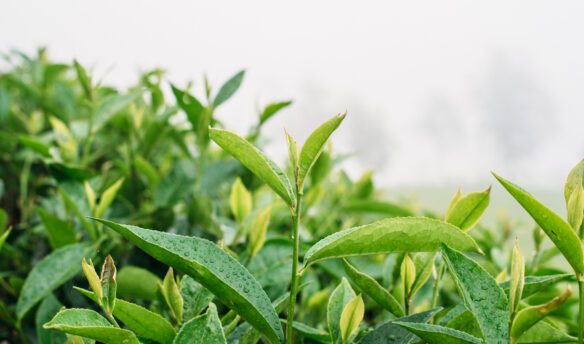A variety of samples from Cave Painter Coffee’s owner, Taylor, from his origin trip to Indonesia. Photos by Mykel Vernon-Sembach
PORTLAND—Specialty coffee is preparing for a swift change. As the industry looks toward its environmental and humanitarian impact, the current economic sphere has many coffee professionals questioning the industry’s foundational methods of production and education. Of these methods, origin trips have been held in high regard by many in the industry. Rich in both hands-on experience and direct relationships throughout the chain of production, this method of education is limited to a select few. It is not often that enthusiasts or professionals—other than roasters, buyers, or owners—have the relationships, finances, time, or opportunity to experience a trip to origin.
Because of this, many in the Portland, Oregon, coffee community gathered at Proud Mary Coffee last Thursday, December 13, to learn about the benefits and impacts that come from participating in origin trips. These shared experiences provide industry professionals a better understanding of how valuable working relationships with farmers can be, and their necessity to ensure the livelihood of coffee producers is fair and of quality.
Jacob Dempsey, a barista at Proud Mary and event organizer in Portland, hosted an informative program, Stories of Origin, that was not shy to lively discussion and thoughtful dialogue on the future of coffee. Dempsey proposed this idea to the coffee community following the success of similar events he had hosted previously in California. Hoping to create a communal coffee event based on empathy, Dempsey sought to better address the impacts coffee has around the world. Events in the coffee community have long had an interesting dynamic; the coffee industry has experienced a heavy divide for those who flourish in the scene’s competitive events while others felt intimidated or underrepresented. Stories of Origin, much like the Cost of Production event hosted by Junior’s Roasted Coffee earlier this month, created a town hall format focused on how the industry could become more ethical.
Dempsey developed a thoughtful lineup of speakers, inviting representatives that reflect a diversity of different coffee-producing nations and their unique goals and topics. The evening began with Cave Painter Coffee owner, Taylor Dinsmore, who offered his experiences in Indonesia. As the fourth-largest exporter of coffee in the world in the 2016–2017 season, it’s surprising that the U.S. doesn’t see specialty Indonesian coffees more frequently. It is common knowledge that
Bethany Keuter, a former coffee professional and current enthusiast, shared her excitement for the cupping of Cave Painters’ vast selection of Indonesian coffees.
“I think it’s important for the global [coffee] economy to include growing [coffee] economies,” she says. “Coffee is really established in Africa and Central America; you don’t see very many from the Pacific Rim and they taste really different.”
Dinsmore discussed that with the growth of Indonesian specialty coffee, Kopi Indonesia is working to assist in branding qualities of newer farms to exemplify the local community palate influenced by regional cuisine and favored characteristics. To sustain the integrity of a varietal, Kopi Indonesia provides education on roasting techniques, and roasting in a variety of communities, to experience the potential of any particular origin. By establishing a brand with a standard of quality and education, Kopi Indonesia could help to create a diversity of flavor profiles for Indonesian coffees while opening the playing field to smaller farmers who might not otherwise be able to sell overseas.
After Dinsmore’s presentation, Junior’s Roasted Coffee co-founder Mike Nelson discussed the Cost of Production project, which asks countries of import to meet producers halfway financially. While the global economy experiences inflating costs related to production as well as
Giovanni Fillari, who manages the popular Instagram page @CoffeeFeedPDX, spoke of what he hopes to see as a customer of specialty coffee.
“At the very least, I feel baristas should be equipped to answer the question when a consumer comes in and begins to ask questions about their coffee’s origin,” he says. “Discussions like these are beneficial because it creates the environment of transparency, where consumers feel comfortable enough to ask the tough questions.”
As Nelson works on the finishing touches on the Cost of Production financial templates, these public discussions encourage the coffee industry to discuss fair prices alongside tasting notes and brewing methods when communicating value across the bar to customers.
“As a coffee enthusiast myself, I feel it is my job to
Proud Mary’s Nolan Hirte rounded out the evening sharing his experiences in Brazil and how, much like Nelson’s Cost of Production, the importance of the human component helps coffee thrive. His personal anecdote of harvesting the yet-to-be-released Brazil Bom Jardim with the Nunes family made for
All of the evening’s presenters shared stories of the hardship, perseverance, and compassion that are essential to building a strong coffee community. Stories of Origin proved to be an enlightening evening that left many attendees lingering to enjoy the in-house cupping while talking about future goals and events.



